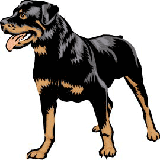Dog Parasite InformationDogs With Hookworms |
|
|
Hookworms are tiny bloodsucking worms that can grow to about one quarter of an inch in size. The name hookworm is due to the fact that one end of its body is bent in the shape of a hook. Hookworms attach themselves to the intestinal lining by means of structures that are equivalent to teeth. These teeth hold the hookworms in place and allow them to feed off the dog's body while causing severe damage to the walls of the intestines. Hookworms continue the blood flow by secreting a substance that inhibits coagulation. The severe blood loss to your dog can cause life threatening anemia and hemorrhaging if the hookworms continue to stay for a long period of time. The adult hookworm lays its eggs in your dog's stomach and intestines. The eggs of the hookworm are passed out in the dog's feces and hatch outside about a week after. When dogs swallow the infected feces, the larvae make their way to the intestine where they hatch into hookworms after a few weeks. The larvae are also capable of penetrating the skin, usually through the area of the feet and eventually find their way to the stomach. Once the hookworms get inside the skin, they travel through the bloodstream and into the lungs, where they dig through the alveoli walls. The hookworms are then expelled through coughing and then get swallowed once again, therefore ending up in the stomach. A mother can transmit hookworms to her puppies through nursing. The infection from hookworm can even start in the womb even before the puppies are born. Symptoms of hookworms are diarrhea, bloody stool, anemia, weakness, emaciation, and skin that looks red and swollen. In treating hookworms, it is vital to take your dog to the vet. The first step in curing hookworms is for your vet to kill them by means of tablets or injections. After killing the hookworms, your vet will then treat your dog from malnutrition or anemia. These conditions are usually related to hookworms and should be treated as well. The vet will probably recommend regular appointments to check for further infestation. You will also have to treat the soil in your yard in case that is the source of hookworms. Your vet should be able to suggest certain products that are suitable for your type of weather. Whenever your dog roams around or defecates on your property, make sure all waste products are removed. This will help in preventing hookworm infestation. Back to the Dog Parasite Information page
| |
|
Related News About Dogs ' ); // get rid of newsfeed display by carp CarpConf('poweredby',''); CarpCacheShow('http://classifieds.agriscape.com/syndicate/dogs.rss'); ?>
|
|
|
|
|
|
Copyright © 2006-2007 dogguidance.com |



